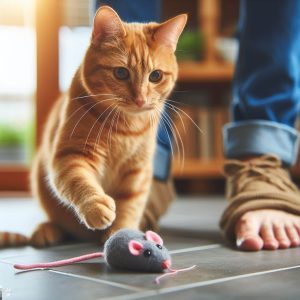As a cat owner, you’re probably used to your cat meowing when it’s hungry or purring when it’s content. But have you ever heard your cat make an odd sound or noise that made you wonder if they’re trying to communicate something is wrong?
Cats can’t speak to tell us when they’re not feeling well, so they often rely on changes in behavior and vocalizations to signal illness or discomfort. Understanding what weird or unusual sounds could potentially indicate your cat is sick is crucial to get them prompt medical treatment.
In this comprehensive guide, we will cover:
- The main types of noises healthy cats make and what they mean
- Strange and abnormal sounds that may be signs of illness
- Specific health conditions linked to weird cat noises
- When you should call the vet about vocalization changes
- Ways to comfort a vocalizing sick cat at home
Armed with this knowledge, you’ll be able to better understand what your cat is trying to communicate when they make odd or disturbing sounds. Let’s start by going over the typical sounds cats make when they are happy and healthy.
Common Noises Healthy Cats Make
Cats have a wide vocabulary of sounds. Here are some of the most frequent vocalizations healthy cats use to communicate their needs and emotions:
Meowing
Meowing is one of the most well-known cat noises. Cats often meow for attention, to demand something (like food or playtime), express displeasure, or communicate with people. Mama cats also meow to talk to their kittens. The pitch and urgency of the meow gives clues to what a cat may want or need when they meow.
Purring
That soft, soothing, rumbling noise is a cat’s purr. Cat’s purr when they are content and happy. The purr originates from the vibrations of the vocal folds deep in the throat. However, cats also sometimes purr to self-soothe when sick, injured, giving birth, or dying. So purring doesn’t always mean a cat is happy and healthy.
Chirping
You’ll notice short, high-pitched chirping sounds when your cat spies prey or a toy they want to play with. These “chatter” noises signal excitement and interest. Some cats chirp when they get face-to-face with another cat too.
Trilling
Trilling is a melodic, affectionate noise cats make that sounds like a combination of a purr and meow. Cats often trill during greeting rituals as a friendly hello. It communicates happiness and affection.
Chattering
That strange rattling noise that sounds like a squirrel is your cat “chattering.” It often happens when they stare longingly at prey like birds or squirrels through the window. The jaw movements mimic the sounds and actions their prey makes. This common vocalization shows excitement and interest.
Growling
A deep, rumbling growl is your cat’s way of saying “back off” before resorting to a swipe of their paw. It signals fear, annoyance, anger, or distrust. Growling means your cat feels threatened by a person, animal, or situation.
Hissing
Like growling, hissing also expresses fear or aggression. It’s an exaggerated version of a cat’s normal exhale of air. Cats usually hiss as a warning before attacking. The hair will stand up on their back as they hiss too.
Now that you know the most common sounds healthy cats make let’s go over some unusual noises that may indicate your cat is unwell.
Weird Cat Noises to Look Out For
While cats use vocalizations daily to express their needs, strange or abnormal sounds can signal underlying health issues. Here are some odd noises to watch out for:
Excessive Vocalizing
While some cats are naturally chattier than others, any sudden excessive meowing, yowling, crying, or other vocalizing behavior could indicate a problem. Frequent attention-seeking noises may signal illness, pain, or distress.
Howling
Some breeds like Siamese are prone to “talking” more than other cats. But loud, constant, drawn out howling or yowling is not normal for cats. This haunting noise may mean your cat is severely distressed or in pain.
Gurgling
Gurgling noises while breathing or purring can indicate congestion in the airways from infections in the nose, throat, or chest. Cats with upper respiratory infections may gurgle as they struggle to breathe around nasal discharge.
Sneezing
Occasional sneezing is common with cats. But repetitive forceful sneezing episodes may indicate an inflammation or infection. Causes can include viruses, bacteria, allergies, or nasal foreign bodies. Seek vet care if frequent sneezing persists more than a day or two.
Coughing
Coughing is not a typical sound for cats. So coughing usually signals some type of respiratory issue that needs veterinary attention. Coughs can indicate infections, asthma, heart disease, parasites, cancer, or other problems requiring treatment.
Wheezing
High-pitched wheezing or whistling noises when breathing point to airway obstruction. Asthma, allergies, respiratory infections, heart disease, or tumors can cause wheezing. Look for open mouth breathing, blue gums, or difficulty breathing along with wheezing.
Grunting
Deep grunting or groaning when breathing is very concerning. It can signal severe pneumonia, fluid around the lungs, or breathing distress. Grunting requires emergency vet care to diagnose and treat the cause before respiratory failure.
Any abnormal breathing changes like choking, gagging, shrieking, screaming, or wheezing always warrant a prompt vet visit. Difficulty breathing or vocalizing can indicate a life-threatening issue requiring urgent medical treatment.
Now let’s go over some specific health conditions that may lead to weird or unusual vocalizations.
Illnesses That Lead to Strange Cat Noises
Certain illnesses cause cats to make odd noises they don’t normally make when healthy. Here are some common medical conditions associated with weird cat sounds:
Upper Respiratory Infections
Upper respiratory infections (URIs) caused by viruses or bacteria lead to congestion, discharge, sneezing, gagging, wheezing, and coughing. The blockages make cats struggle to breathe normally. The thick congestion also causes choking or gagging sounds as they try to clear their airways.
Asthma
Asthmatic cats often pant with their mouths open, wheeze loudly, and make gurgling sounds as they try to breathe. The inflammation in their airways causes distress. Severe asthma attacks lead to gasping, wheezing, coughing, and even odd vocalizations or crying.
Heart Disease
Advanced heart disease can cause fluid backup in the lungs. This results in crackly breathing sounds, grunting, and labored breathing. The breathing difficulty creates anxiety and distress vocalizations.
Hyperthyroidism
Hyperthyroidism results in a faster metabolism which can cause vomiting, gagging, and hacking after eating. The condition itself also changes the tone and sound of a cat’s meow, creating a strained, hoarse, almost yowling vocalization.
Dental Disease
Cats with severe dental disease have tooth decay, abscesses, and mouth pain. This leads to difficulty eating, sometimes accompanied by choking, gagging, drooling, and yowling. The mouth pain and infection causes obvious distress.
Cancer
Some cancers like lymphoma can cause swollen tissues that obstruct breathing. Tumors can also compress nerves and organs causing pain and vocalizations. Feline leukemia and FIV put cats at higher risk for certain cancers like lymphoma.
Deafness
Deaf cats cannot hear the volume of their own meows and cries. This results in abnormally loud, exaggerated vocalizations that can sound strange or eerie compared to hearing cats.
The takeaway is that any odd sound like gurgling, grunting, screaming, sneezing, or coughing can potentially indicate a health issue requiring veterinary attention. Don’t delay in getting treatment for your cat’s weird noises or vocalizations changes.
When to Call the Vet About Vocal Changes
Most meows, trills, and purrs aren’t cause for concern. But significant alterations in your cat’s typical vocal patterns warrant a call to the veterinarian. Here are some general guidelines on when to seek medical care:
- Your cat is making sounds or noises they have never made before
- Vocalizations seem painful, strained, urgent, or fearful
- Your cat is howling, crying, yowling, screaming, or other intense vocalizing
- You hear gagging, coughing, wheezing, sneezing, or choking sounds
- Breathing appears congested, crackly, raspy, gurgling, or labored
- Any vomiting, open mouth breathing, or difficulty breathing
- Vocalizations are accompanied by lethargy, weakness, or hiding
- Significant changes in meow tone and sound
Kittens and senior cats are especially vulnerable when they exhibit vocalization changes. Contact your vet promptly if your cat has any unusual sounds or behavior paired with their odd noises. Try capturing a video or audio recording of the sounds to show the vet.
Get emergency veterinary care immediately if your cat is making choking noises, severe wheezing, or seems unable to breathe. These signs indicate a potentially life-threatening issue needing urgent evaluation and treatment.
Tips to Comfort a Vocalizing Sick Cat
When your cat is sick and vocalizing, here are some tips to help ease their suffering at home before you can get veterinary treatment:
- Keep them isolated and calm – Choose a quiet room in your home and limit external stressors and sounds. Make sure they have peaceful hiding spots, food, water, litter box, and any medications.
- Tempt their appetite – Encourage eating to keep up strength with tasty treats like bone broth, bonito flakes, or human-grade meat baby food. Assist feed if needed.
- Try natural calming remedies – Provide catnip or chamomile treats. You can also use calming pheromone sprays or diffusers to reduce anxiety.
- Offer affection – If your cat seems receptive to touch, provide gentle petting, brushing or massage. Your comforting presence can help ease distress.
- Keep monitoring – Check frequently on any vomiting, diarrhea, worsening symptoms, or further vocalization changes. Update your vet promptly.
- Ask about medications – Your vet may prescribe sedatives, pain medication, or other drugs to reduce your cat’s suffering and vocalizations until the underlying illness is diagnosed and treated.
With supportive care at home and proper medical treatment of the root cause, your cat should recover and get back to more normal vocal communication and sounds.
The Takeaway: Understand Your Cat’s Sounds
Cats have an amazing array of vocalizations to communicate their needs, moods, and emotions. By learning your own cat’s particular repertoire of meows, chirps, purrs, and trills when they are happy and healthy, you’ll be better able to notice when they make odd or unusual noises that could signal illness or injury.
Pay attention for any significant vocalization changes, especially yowling, crying, wheezing, sneezing, grunting, or coughing. Make an appointment with your veterinarian promptly if your cat exhibits weird sounds paired with other symptoms like lethargy or hiding. The sooner your cat gets medical treatment for the underlying condition causing their odd vocalizations, the better their prognosis.
With supportive care at home and proper treatment, most cats will go back to their regular vocal communication and noises as they recover. So keep a watchful ear out for weird sounds from your cat that may indicate sickness and the need for timely medical attention. Understanding what your cat’s sounds mean will help you keep them happy and healthy!



